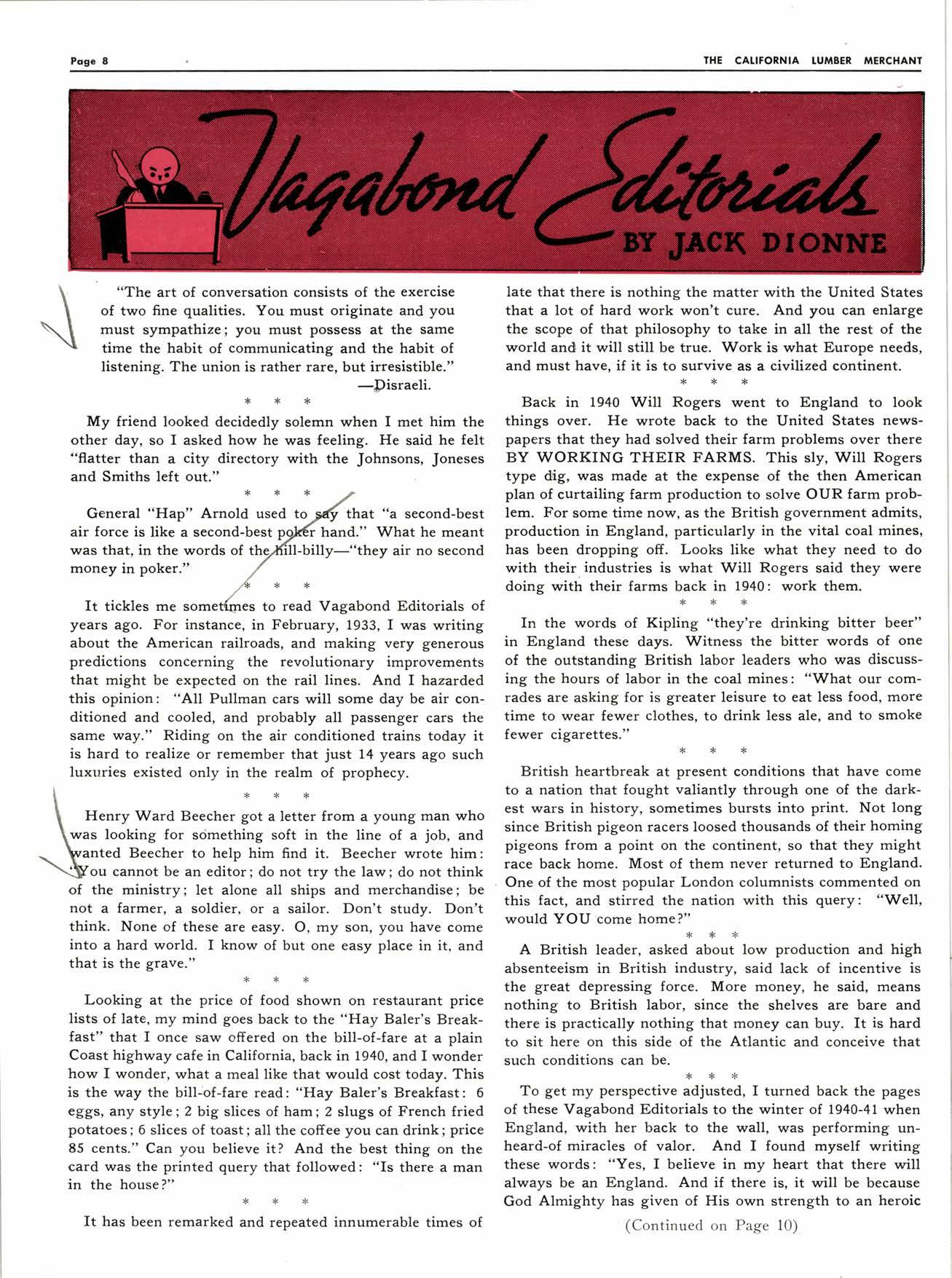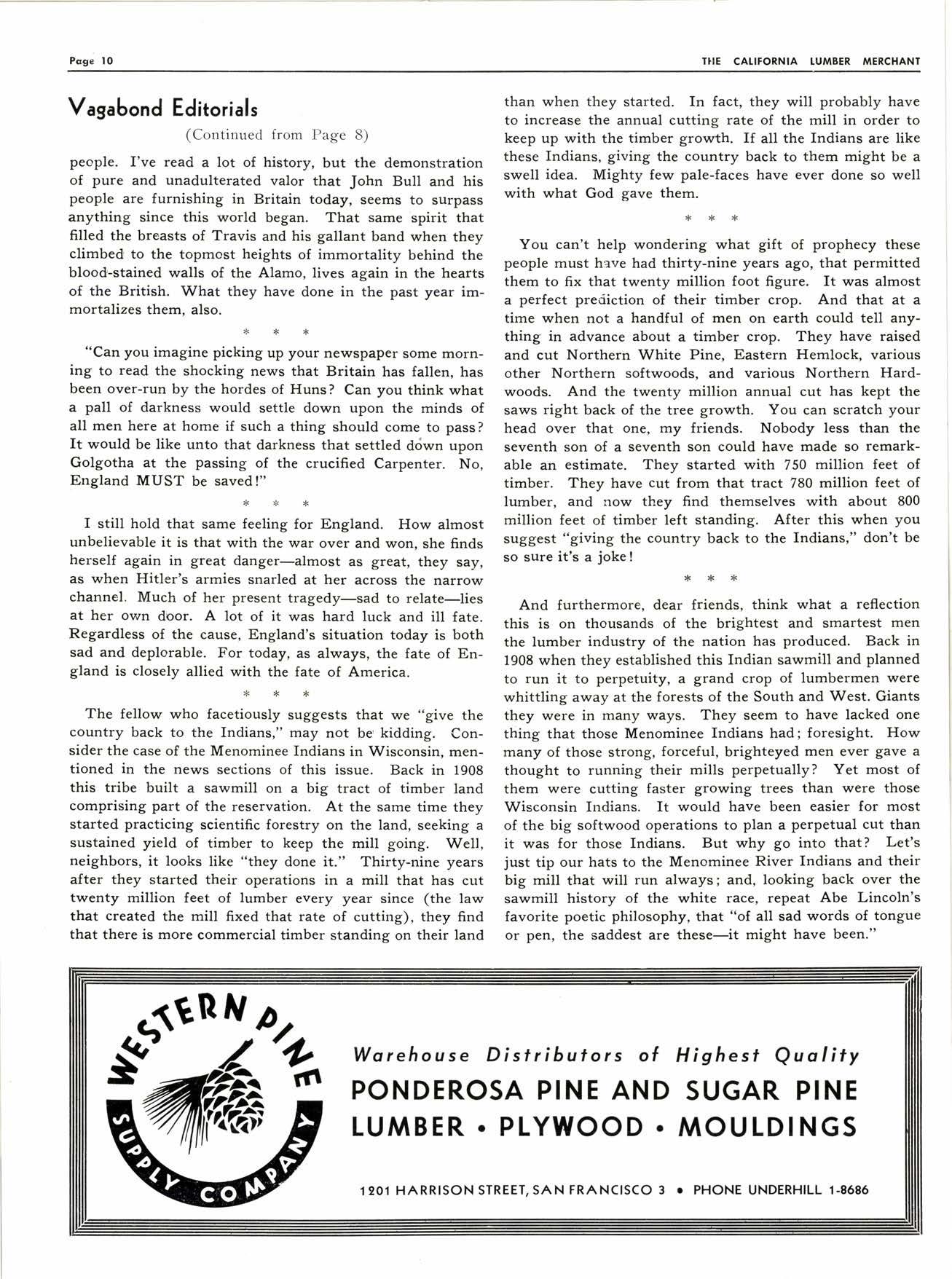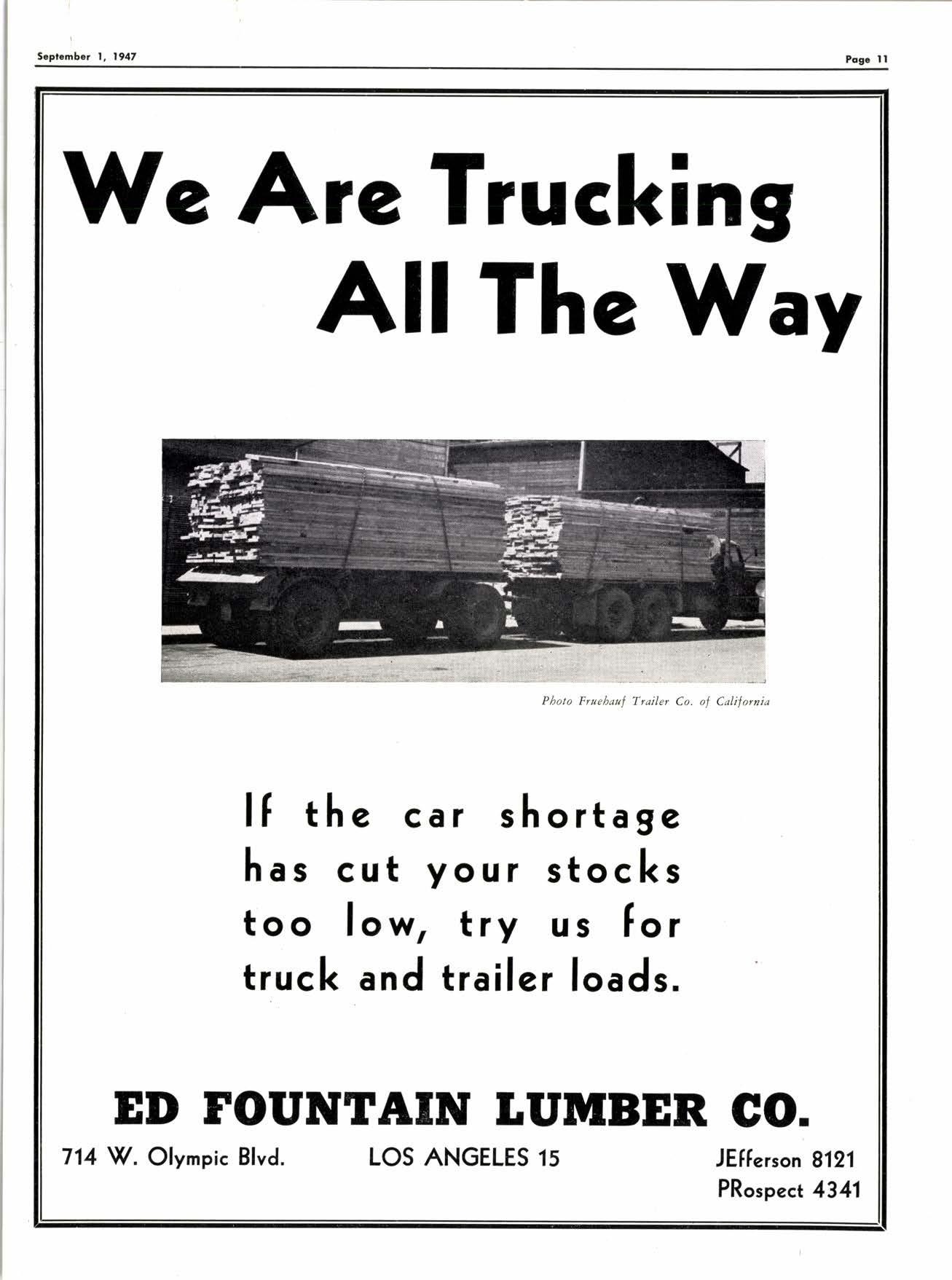
7 minute read
United Stotes G psum
"The art of conversation consists of the exerclse of two fine qualities. You must originate and you must sympathize; you must possess at the same time the habit of communicating and the habit of listening. The union is rather rare, but irresistible."
My friend looked decidedly solemn when I met him the other day, so I asked how he was feeling. He said he felt "flatter than a city directory with the Johnsons, Joneses and Smiths left out."
,<** late that there is nothing the matter with the United States that a lot of hard work won't cure. And you can enlarge the scope of that philosophy to take in all the rest of the world and it will still be true. Work is what Europe needs, and must have, if it is to:"tY. as a civilized continent.
General "FIap" Arnold used to that "a second-best air force is like a second-best hand." What he meant was that. in the words of t ill-billy-"they air no second money in poker,"
It tickles me
** to read Vagabond Editorials of years ago. For instance, in February, 1933, I was writing about the American railroads, and making very generous predictions concerning the revolutionary improvements that might be expected on the rail lines. And I hazarded this opinion: "All Pullman cars will some day be air conditioned and cooled, and probably all passenger cars the same way." Riding on the air conditioned trains todtay it is hard to realize or remember that just 14 years ago such luxuries existed only in the realm of prophecy.
l.r(*
\ Henry Ward Beecher got a letter from a young man who \was looking for sdmething soft in the line of a job, and \- \ranted Beecher to help him find it. Beecher wrote him: \$aou cannot be an editor; do not try the law; do not think of the ministry; let alone all ships and merchandise; be not a farmer, a soldier, or a sailor. Don't study. Don't think. None of these are easy. O, my son, you have come into a hard world. I know of but one easy place in it, and that is the grave."
Looking at the price of food shown on restaurant price lists of late, my mind goes back to the "Hay Baler's Breakfast" that I once saw offered on the bill-of-fare at a plain Coast highway cafe in California, back in 1940, and I wonder how I wonder, what a meal like that would cost today. This is the way the bill-of-fare read: "Hay Baler's Breakfast: 6 eggs, any style; 2 big slices of ham; 2 slugs of French fried potatoes; 6 slices of toast; all the coffee you can drink; price 85 cents." Can you believe it? And the best thing on the card was the printed query that followed: "Is there a man in the house ?" * * ,6
It has been remarked and repeated innumerable times of
Back in 1940 Will Rogers went to England to look things over. He wrote back to the United States newspapers that they had solved their farm problems over there BY WORKING THEIR FARMS. This sly, Will Rogers type dtig, was made at the expense of the then American plan of curtailing farm production to solve OUR farm problem. For some time now, as the British government admits, production in England, particularly in the vital coal mines, has been dropping off. Looks like what they need to do with their industries is what Will Rogers said they were doing with their farms b;ck *in 1940: work them.
In the words of Kipling "they're drinking bitter beer" in England these days. Witness the bitter words of one of the outstanding British labor leaders who was discussing the hours of labor in the coal mines: "What our comrades are asking for is greater leisure to eat less food, more time to wear fewer clothes. to drink less ale, and to smoke fewer cigarettes."
British heartbreak at present conditions that have come to a nation that fought valiantly through one of the darkest wars in history, sometimes bursts into print. Not long since British pigeon racers loosed thousands of their homing pigeons from a point on the continent, so that they might race back home. Most of them never returned to England. One of the most popular London columnists commented on this fact, and stirred the nation with this query: "We11, would YOU come home?"
A British leader, ""k.d* ";"J low production and high absenteeism in British industry, said lack of incentive is the great depressing force. More money, he said, means nothing to British labor, since the shelves are bare and there is practically nothing that money can buy. It is hard to sit here on this side of the Atlantic and conceive that such conditions can be. *>k*
To get my perspective adjusted, I turned back the pages of these Vagabond Editorials to the winter of 1940-41 when England, with her back to the wall, was performing unheard-of miracles of valor. And I found myself writing these words: "Yes, f befeve in my heart that there will always be an England. And if there is, it will be because God Almighty has given of His own strength to an heroic on Page 10)
Deaiers
USE THESE...
The New Rockwoot Batt With Ptastic Binder
Golden Fleece is the nes' standard of valuc in household insulation.

Thesc beautiful rockwool batts assure morc profits for vou because theY give greater valuc to the home builder.
Handsome
Ther''rc engineered to do a superlative job of insulation. Thcr,'re laboratorv tcsted. A plastic is emplor ed that guaranteei lifetime flulfiness zrnd a maximun.r of dead air cells. The moistureproof barrier, built into the batt, gives allweather protecti()n. The nailing flange speeds application holds Carnel' Golden Fleece firmly in place.
CARNHY Golden Fleece is sold by lumber dealers exclusivelv backed bt' forceful'merchandising and dealei helps. Cail or write us todav for complctc informaiion about . . CARNE* Golden Fleece.
Vagabond Editorials
(Continued from Page 8) people. I've read a lot of history, but the demonstration of pure and unadulterated valor that John Bull and his people are furnishing in Britain today, seems to surpass anything since this world began. That same spirit that filled the breasts of Travis and his gallant band when they climbed to the topmost heights of immortality behind the blood-stained walls of the Alamo, lives again in the hearts of the British. What they have done in the past year immortalizes them, also. x>t*
"Can you imagine pi"r.i"g * ,*, newspaper some morning to read the shocking news that Britain has fallen, has been over-run by the hordes of Huns? Can you think what a pall of darkness would settle down upon the minds of all men here at home if such a thing should come to pass ? It would be like unto that darkness that settled ddwn upon Golgotha at the passing of the crucified Carpenter. No, England MUST be saved !"
I still hold that same feeling for England. How almost unbelievable it is that with the war over and won, she finds herself again in great danger-almost as great, they say, as when Hitler's armies snarled at her across the narrow channel. Much of her present tragedy-sad to relate-lies at her own door. A lot of it was hard luck and ill fate. Regardless of the cause, England's situation today is both sad and deplorable. For today, as always, the fate of England is closely allied with the fate of America.
The fellow *no f"..til.r.r] .uf*."ts that we "give the country back to the Indians," may not be' kidding. Consider the case of the Menominee Indians in Wisconsin. mentioned in the news sections of this issue. Back in 1908 this tribe built a sawmill on a big tract of timber land comprising part of the reservation. At the same time they started practicing scientific forestry on the land, seeking a sustained yield of timber to keep the mill going. Well, neighbors, it looks like "they done it." Thirty-nine years after they started their operations in a mill that has cut twenty million feet of lumber every year since (the law that created the mill fixed that rate of cutting), they find that there is more commercial timber standing on their land than when they started. In fact, they will probably have to increase the annual cutting rate of the mill in order to keep up with the timber growth. If all the Indians are like these Indians, giving the country back to them might be a swell idea. Mighty few pale-faces have ever done so well with what God gave them.

You can't help wonderl"*.*rL. gift of prophecy these people must have had thirty-nine years ago, that permitted them to fix that twenty million foot figure. It was almost a perfect prediction of their timber crop. And that at a time when not a handful of men on earth could tell anything in advance about a timber crop. They have raised and cut Northern White Pine. Eastern Hemlock. various other Northern softwoods, and various Northern Hardwoods. And the twenty million annual cut has kept the saws right back of the tree growth. You can scratch your head over that one, my friends. Nobody less than the seventh son of a seventh son could have made so remarkable an estimate. They started with 750 million feet of timber. They have cut from that tract 780 million feet of lumber, and now they find themselves with about 800 million feet of timber left standing. After this when you suggest "giving the country back to the Indians," don't be so sure it's a joke !
And furthermore, dear friends, think what a reflection this is on thousands of the brightest and smartest men the lumber industry of the nation has produced. Back in 1908 when they established this Indian sawmill and planned to run it to perpetuity, a grand crop of lumbermen were whittling away at the forests of the South and West. Giants they were in many ways. They seem to have lacked one thing that those Menominee Indians had; foresight. How many of those strong, forceful, brighteyed men ever gave a thought to running their mills perpetually? Yet most of them were cutting faster growing trees than were those Wisconsin Indians. It would have been easier for most of the big softwood operations to plan a perpetual cut than it was for those Indians. But why go into that? Let's just tip our hats to the Menominee River Indians and their big mill that will run always; and, looking back over the sawmill history of the white race, repeat Abe Lincoln's favorite poetic philosophy, that "of all sad words of tongue or pen, the saddest are these-it might have been."









